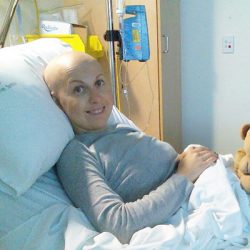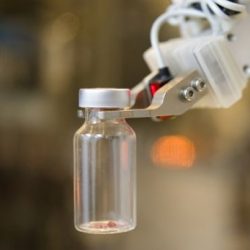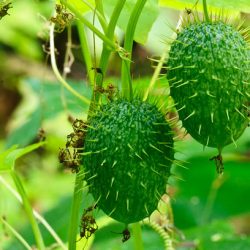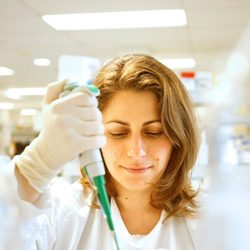Green tea and its extracts have been widely touted as potential treatments for cancer, as well as several other diseases. But scientists have struggled to explain how the green tea and its extracts may work to reduce the risk of cancer or to slow the growth of cancer cells. A study recently published online by the journal, Metabolomics, offers an explanation that researchers … [Read more...]
Cancer News

Easing pain and getting back quality of life for cancer survivors: University of New Mexico Study
More and more people are surviving their cancer. Unfortunately, sometimes survival can come with pain. Although many people won’t feel any pain after their cancer treatment, some may have chronic, bothersome pain. The niggling pain reminds them of their cancer every time they perform an everyday task, like writing a grocery list. But in a very few cases, pain can be so severe … [Read more...]
Cervical cancer treatment: A Study
The first large international study to investigate the late side-effects of a combination of two forms of brachytherapy to treat cervical cancer has shown that the technique successfully delivers higher radiation doses to the tumour without an increase in treatment-related problems afterwards. Brachytherapy is a type of internal radiotherapy that involves putting a … [Read more...]
Researchers decode molecular action of combination therapy for a deadly thyroid cancer: A Study
In their bid to find the best combination of therapies to treat anaplastic thyroid cancer (ATC), researchers on Mayo Clinic's Florida campus demonstrated that all histone deacetylase (HDAC) inhibitors are not created equal. In testing multiple HDAC inhibitors in combination with the chemotherapy drug paclitaxel, known to give some benefit for this aggressive cancer, they … [Read more...]
Chemotherapy and quality of life at the end of life: A Study
Chemotherapy for patients with end-stage cancer was associated with worse quality of life near death for patients with a good ability to still perform many life functions, according to an article published online by JAMA Oncology. Physicians have voiced concerns about the benefits of chemotherapy for patients with cancer who are nearing death. An American Society of Clinical … [Read more...]
Leukemia thwarted by cutting off link to environmental support: University of California Study
A new study by researchers at University of California, San Diego School of Medicine reveals a protein's critical -- and previously unknown -- role in the development and progression of acute myeloid leukemia (AML), a fast-growing and extremely difficult-to-treat blood cancer. The finding offers a novel target for better treating AML, and possibly other cancers, by cutting … [Read more...]
Rates of breast and cervical cancer screening among Latinas are low: A Study
It has long been known that rates of breast and cervical cancer screening among Latinas are low compared to rates for U.S. women overall. A study led by researchers at Roswell Park Cancer Institute (RPCI) found that age and fear of cancer diagnosis are among the reasons why Latina women do not continue participation following breast and cervical cancer education programs. The … [Read more...]
Women with Lynch syndrome and risk of endometrial cancer linked: A Study
For women with Lynch syndrome, an association was found between the risk of endometrial cancer and the age of first menstrual cycle, having given birth, and hormonal contraceptive use, according to a study in the July 7 issue of JAMA. Lynch syndrome is a genetic condition that increases the risk for various cancers. Endometrial cancer is the most common type of gynecologic … [Read more...]
Cancer patients should speak with their doctors about dietary supplements: University of Texas Study
Many cancer patients use dietary supplements such as vitamins, minerals and herbs or other botanicals but often don't tell their doctor. This gap in communication can happen when patients believe that their doctors are indifferent or negative toward their use of these supplements. As a result, patients may find information about dietary supplements from unreliable sources, … [Read more...]
Link between nerves and cancer cells: University of Michigan
In certain types of cancer, nerves and cancer cells enter an often lethal and intricate waltz where cancer cells and nerves move toward one another and eventually engage in such a way that the cancer cells enter the nerves. The findings, appearing in Nature Communications, challenge conventional wisdom about perineural invasion, which holds that cancer cells are marauders … [Read more...]
Researcher finds treatment of cancer pain: A Canadian Study
A new study led by University of Toronto researcher Dr. David Lam has discovered the trigger behind the most severe forms of cancer pain. Released in the journal Pain this month, the study points to TMPRSS2 as the culprit: a gene that is also responsible for some of the most aggressive forms of androgen-fuelled cancers. Head of Oral and Maxillofacial Surgery at the Faculty … [Read more...]
Researchers discover how ovarian cancer halts body’s natural defense against tumor
Ovarian cancer shuts down immune system cells that would otherwise act as a first line of defense against the deadly tumor, Weill Cornell Medical College scientists report. But a therapy that restores the cells' disease-fighting abilities could provide a powerful new strategy to attack the cancer, which kills more than 14,000 women each year. In the June 11 issue of Cell, … [Read more...]
Treatment factors associated with oral cavity cancer survival: A Study
The surgical procedure known as neck dissection to remove lymph nodes and receiving treatment at academic or research institutions was associated with improved survival in patients with stages I and II oral cavity squamous cell cancer (OCSCC), according to a report published online by JAMA Otolaryngology-Head & Neck Surgery. There were about 28,000 cases of OCSCC in the … [Read more...]
Tea and citrus products could lower ovarian cancer risk: University of East Anglia Study
Tea and citrus fruits and juices are associated with a lower risk of developing ovarian cancer, according to new research from the University of East Anglia (UEA). The research reveals that women who consume foods containing flavonols and flavanones (both subclasses of dietary flavonoids) significantly decrease their risk of developing epithelial ovarian cancer, the … [Read more...]
New Research in anemic patients with head and neck cancer
Long-term analysis of Radiation Therapy Oncology Group (RTOG) 9903 demonstrates that the addition of erythropoietin (EPO) did not improve local-regional control for anemic patients with head and neck squamous cell carcinoma (HNSCCa) who receive radiation therapy or chemoradiation, according to a study published in the April 1, 2015 issue of the International Journal of … [Read more...]
Integrative medicine relieves pain, anxiety for cancer patients: A Study
Over eighty percent of breast cancer patients in the United States use complementary therapies following a breast cancer diagnosis, but there has been little science-based guidance to inform clinicians and patients about their safety and effectiveness. In newly published guidelines from the Society for Integrative Oncology, researchers at Columbia University's Mailman School of … [Read more...]
Wild cucumbers can treat cancer and diabetes: University of California Study
High-tech genomics and traditional Chinese medicine come together as researchers identify the genes responsible for the intense bitter taste of wild cucumbers. Taming this bitterness made cucumber, pumpkin and their relatives into popular foods, but the same compounds also have potential to treat cancer and diabetes. "You don't eat wild cucumber, unless you want to use it as … [Read more...]
Green tea ingredient may target protein to kill oral cancer cells: A Study
A compound found in green tea may trigger a cycle that kills oral cancer cells while leaving healthy cells alone, according to Penn State food scientists. The research could lead to treatments for oral cancer, as well as other types of cancer. Earlier studies had shown that epigallocatechin-3-gallate -- EGCG -- a compound found in green tea, killed oral cancer cells without … [Read more...]
Discontinuing statins in cancer patients help improve patients quality of life: University of Colorado Study
Discontinuing statin use in patients with late-stage cancer and other terminal illnesses may help improve patients' quality of life without causing other adverse health effects, according to a new study by led by researchers at the University of Colorado Anschutz Medical Campus and Duke University and funded by the National Institute of Nursing Research (NINR). The finding, … [Read more...]
Link between stress and cancer treatment: A Study
Psychological stress alone does not cause cancer but it can interfere with the immune system's response to cancer cells, which may increase the potential of metastasis, and cause neurochemical imbalance that may impact the survival of a patient with cancer. In a Theory and Hypothesis paper titled "The preparatory set: A novel approach to understanding 'stress,' … [Read more...]
Attitudes about alternative medicine leads cancer patients to use them: University of Pennsylvania Study
A cancer patient's expectations about the benefits of complementary and alternative (CAM) and their perceived access to CAM therapies are likely to guide whether or not they will use those options, according to a new study published ahead of print in the journal CANCER from researchers at Abramson Cancer Center of the University of Pennsylvania. The team found that attitudes … [Read more...]
Stress relief techniques help cancer patients overcome fear of treatment: A Study
A service evaluation at The Christie NHS Foundation Trust in Manchester, England, has shown the benefit of rapid stress management techniques (RSMTs) to help cancer patients who experience 'procedure-related' stress. Cancer patients benefit from stress relief techniques and complementary therapy to manage their fears of medical procedures, according to a new service … [Read more...]
ESD: Removing Tumors Without a Scar
Removing lesions inside the stomach used to mean a large incision and a lot of cutting. But now there’s an easier approach. Doctors are removing tumors without a scar! Cheryl Capitena-Johnson loves to experiment in the kitchen…but when it comes to her health, she’s not taking any chances! Cheryl told Ivanhoe, “Once I hit my 50s, I decided that I was going to be very … [Read more...]
Cancer drug FY26 is 49 times more potent: A University of Warwick Study
Tests have shown that a new cancer drug, FY26, is 49 times more potent than the clinically used treatment Cisplatin. Based on a compound of the rare precious metal osmium and developed by researchers at the University of Warwick's Department of Chemistry and the Warwick Cancer Research Unit, FY26 is able to shut down a cancer cell by exploiting weaknesses inherent in their … [Read more...]
Nut consumption associated with reduced risk of some types of cancer: A Study
Cancer and type 2 diabetes are two of the most significant public health burdens facing the world today, and currently available data suggests their prevalence is expected to continue to increase. Nut consumption has long been hypothesized to have a role in preventing both of these diseases, but until now evidence has been inconsistent. A new systematic review and meta-analysis … [Read more...]
Arthritis drug could be used to treat blood cancer: A University of Sheffield Study
Scientists at the University of Sheffield have discovered that a common drug given to arthritis sufferers could also help to treat patients with blood cancers. Myeloproliferative neoplasms (MPN) are diagnosed in around 3,300 UK patients every year and cause an overproduction of blood cells creating a significant impact on quality-of-life, with symptoms such as night sweats, … [Read more...]
New treatments that can protect against colon cancer
New treatments have been found that can protect against colon cancer. Scientists at St. Jude Children's Research Hospital have discovered how an immune system protein, called AIM2 (Absent in Melanoma 2), plays a role in determining the aggressiveness of colon cancer. They found that AIM2 deficiency causes uncontrolled proliferation of intestinal cells. Surprisingly, they … [Read more...]
Cigarette smoking leads to 50% of Cancer related deaths: A Study
A study has concluded that cigarette smoking leads to 48.5% of cancer related deaths. Researchers estimate that 48.5 percent of the nearly 346,000 deaths from 12 cancers among adults 35 and older in 2011 were attributable to cigarette smoking, according to an article published online by JAMA Internal Medicine. Researcher Rebecca L. Siegel, M.P.H., of the American Cancer … [Read more...]
New research in understanding origins of ovarian cancer
New research by an international team including Keck Medicine of USC scientists is bringing the origins of ovarian cancer into sharper focus. The study, published online June 15 in the peer-reviewed journal Nature Genetics, highlights the discovery of three genetic variants associated with mucinous ovarian carcinomas (MOCs), offering the first evidence of genetic susceptibility … [Read more...]
Avocados could be effective in treating cancer: A Study
A study has confirmed that Avocados could be effective in treating cancer. Rich, creamy, nutritious and now cancer fighting. New research reveals that molecules derived from avocados could be effective in treating a form of cancer. Professor Paul Spagnuolo from the University of Waterloo has discovered a lipid in avocados that combats acute myeloid leukemia (AML) by targeting … [Read more...]
- « Previous Page
- 1
- …
- 8
- 9
- 10
- 11
- 12
- …
- 37
- Next Page »




























